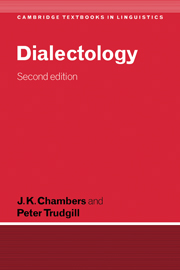8 - Transitions
Published online by Cambridge University Press: 05 June 2012
Summary
As we have seen, isoglosses serve a number of descriptive purposes in dialectology. Sometimes the patterns they form are recognisable types, as in the criss-cross of old, established regions and the insularity of relic areas. They bundle together at more significant dialect junctures, and they sometimes correlate with other aspects of regional culture whose distribution can be plotted geographically.
Yet the isogloss, as any dialect geographer nowadays would surely agree, represents a very abstract conceptualisation of the way in which dialect regions meet. Neighbours who speak the same language normally interact with one another to some degree, no matter how insular their occupations or how difficult the terrain between them. Interaction, even for the most isolated people, stimulates bonds of various kinds, such as sharing tips about egg production or showing off a new sun hat or using local words for discussing local events. Neighbours seldom differ absolutely in any respect. In order for dialect regions to abut as abruptly as the isogloss implies, they would have to be separated by an unbridgeable abyss.
Maintaining the isoglossic abyss depends upon looking at only one question and counting only one response to it. Amalgamating answers for several questions or counting more than one answer introduces variability, and variability causes the isogloss to vanish.
In this chapter, we consider the linguistic variability that underlies the isogloss and is literally hidden by it.
- Type
- Chapter
- Information
- Dialectology , pp. 104 - 124Publisher: Cambridge University PressPrint publication year: 1998



